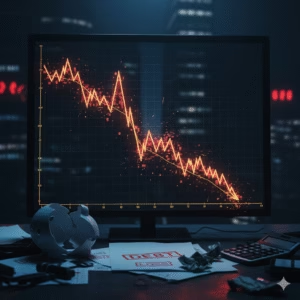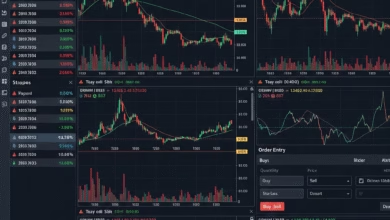How Recent Events Distort Market Decisions
Understand how news and events impact financial market decisions

In the world of investing, we like to think of ourselves as rational beings, making calculated decisions based on data and long-term strategy. But the reality is often far messier. Our minds are hardwired with cognitive shortcuts and emotional triggers that, while useful for survival in the ancient world, can be disastrous for our portfolios in the modern one.
One of the most powerful and distorting influences on our financial judgment is our reaction to recent events. A sudden market dip, a blockbuster earnings report from a tech giant, or a wave of negative economic news can feel all-encompassing, causing us to abandon carefully laid plans in a moment of panic or euphoria.
This article will pull back the curtain on the psychological traps that recent events set for investors. We will explore why a single headline can feel more important than a decade of data, and more importantly, provide you with the strategies to build a more resilient, clear-headed approach to managing your money. Understanding these mental glitches is the first step to overcoming them and becoming a more successful long-term investor.
Recency Bias: Why Today’s News Feels Like Tomorrow’s Certainty

Have you ever noticed how, after a few rainy days, you start to feel like the sun will never shine again? That’s recency bias in a nutshell. It’s a cognitive shortcut that causes our brains to give more importance to recent experiences than to historical data. In investing, this is a portfolio killer.
When the market is soaring, recency bias convinces us that stocks will only go up. We forget the inevitable corrections and bear markets of the past. Fueled by this optimism, we might take on excessive risk, piling into high-flying stocks at their peak, convinced the party will never end.
Conversely, when the market takes a nosedive, recency bias whispers that the sky is falling. The sharp, painful memory of seeing red in our accounts overshadows the long-term historical trend of market recovery and growth. This can lead to panic selling—locking in losses and sitting on the sidelines in cash, too fearful to get back in, often missing the best recovery days that follow a downturn.
How to Spot Recency Bias in Action:
- You find yourself thinking, “This time it’s different,” to justify a major shift in your strategy.
- Your investment decisions are heavily influenced by the market’s performance over the last week or month, rather than the last five or ten years.
- You feel an overwhelming urge to sell your stocks after a market drop or go “all-in” after a sudden rally.
The truth is, market conditions are cyclical. Periods of growth are followed by periods of contraction. By over-weighting recent events, you are essentially driving your car while looking only in the rearview mirror. You see where you’ve just been, but you have no idea what’s coming around the bend.
The Availability Heuristic: When Vivid Headlines Cloud Your Judgment
What’s more likely to happen: a fatal shark attack or a fatal accident involving a vending machine? The answer, surprisingly, is the vending machine. But because shark attacks are dramatic, terrifying, and receive massive media coverage, they are far easier for our brains to recall. This is the availability heuristic at work: if something is easy to remember, we assume it’s more common or more likely to happen again.
The financial media is a master at triggering the availability heuristic. Scary, dramatic headlines are designed to grab your attention. “Market in Freefall,” “Inflation Scare Wipes Billions from Stocks,” “Is This The Next Great Depression?”
These vivid headlines create powerful mental images that stick with us. When we think about risk, we don’t recall the thousands of quiet, boring, and profitable days in the market. We recall the sensationalized images of traders with their heads in their hands on the floor of the stock exchange.
This cognitive bias can cause investors to make profoundly irrational decisions. They might avoid the stock market entirely, convinced a crash is always just around the corner, because the memory of 2008 is so vivid. Or, on the flip side, they might pile into a “meme stock” because the stories of overnight millionaires are so compelling and easy to recall, ignoring the thousands of investors who lost their shirts.
Overcoming the Availability Heuristic:
- Seek Out Data, Not Drama: Instead of relying on headlines, look at long-term data. How have markets performed after previous downturns? What is the historical probability of a 20% drop versus a 20% gain in any given year?
- Recognize the Media’s Business Model: Understand that financial news outlets are selling a product: your attention. Sensationalism sells. Their goal is not necessarily to make you a better investor, but to keep you watching.
- Create a “Boring” Investment Plan: The most successful investment strategies are often the most boring ones. A diversified, automated, long-term plan doesn’t make for a good headline, but it’s incredibly effective at building wealth.
Herd Mentality and FOMO: The Dangers of Following the Crowd

Humans are social animals. For millennia, our survival depended on sticking with the tribe. This instinct is still deeply ingrained in us, and it manifests in the market as herd mentality. When everyone around us is doing the same thing—whether it’s rushing to buy a hot tech stock or dumping everything during a panic—we feel an intense psychological pressure to do the same.
Recent events are the primary catalyst for herd behavior. A positive news story can create a surge of buying, and the rising price attracts more buyers. This is fueled by the Fear of Missing Out (FOMO). You see your friends, colleagues, or even anonymous people on social media boasting about their gains, and you feel an almost physical need to get in on the action before it’s “too late.”
This creates a dangerous feedback loop where asset prices become detached from their fundamental value. The price is no longer driven by a company’s earnings or growth prospects, but purely by speculation and social momentum. The dot-com bubble of the late 1990s and the more recent frenzy around certain cryptocurrencies and meme stocks are classic examples of herd mentality in action.
The reverse is also true. During a market downturn, a wave of negative news can trigger a cascade of selling. As prices fall, more people panic and sell, which drives prices even lower. In these moments, selling feels like the “safe” and “obvious” thing to do because everyone else is doing it. But history shows that the investors who hold their ground—or even buy when others are fearful—are the ones who are rewarded in the long run.
How to Protect Yourself from the Herd:
- Have Pre-Defined Rules: Before a crisis hits, establish clear rules for when you will buy or sell an investment. For example, “I will rebalance my portfolio every six months,” or “I will not sell a stock based on a single day’s price movement.”
- Do Your Own Research: Never invest in something just because it’s popular. Understand what you are buying. What does the company do? Is it profitable? What is its long-term potential?
- Be a Contrarian: While it’s not always right, it’s worth asking yourself: “What if the crowd is wrong?” Often, the greatest investment opportunities are found in assets that are currently unpopular or overlooked.
Actionable Strategies to Build a Resilient Investment Mindset
Recognizing these psychological biases is half the battle. The other half is implementing practical strategies to counteract them. Here’s how you can build a defensive framework to protect your portfolio from the emotional fallout of current events.
1. Craft a Formal Investment Policy Statement (IPS)
This might sound intimidating, but it’s simply a written document that outlines your investment goals, risk tolerance, and long-term strategy. It’s your financial constitution. When you’re tempted to react to a scary headline, your IPS is the anchor that reminds you of your long-term plan. It forces you to ask: “Does this recent event fundamentally change my long-term financial goals or my timeline for achieving them?” Ninety-nine percent of the time, the answer is no.
2. Automate Your Investments
The single best way to remove emotion from investing is to automate it. Set up automatic contributions to your 401(k), IRA, or brokerage account every month or every payday. This strategy, known as dollar-cost averaging, ensures you are consistently buying, regardless of what the market is doing. When prices are high, you buy fewer shares. When prices are low (and headlines are scary), you automatically buy more shares at a discount. It’s a simple but powerful way to force yourself to “buy low.”
3. Zoom Out: Embrace the Long-Term Perspective
When you’re feeling anxious about a recent market drop, pull up a chart of the S&P 500 over the last 50 years. You will see wars, recessions, pandemics, and political crises. You will also see that every single downturn has eventually been followed by a new all-time high. This long-term perspective is a powerful antidote to short-term panic. It reframes a scary drop not as a catastrophe, but as a temporary and normal part of the long-term journey of wealth creation.
4. Curate Your Information Diet
You are what you consume, and this applies to financial information as well. If your diet consists of sensationalist cable news and frantic social media posts, your financial health will suffer. Limit your exposure to a constant stream of market noise. Instead, schedule a weekly or monthly check-in. Choose a few high-quality, data-driven sources for your information, such as reputable financial journals, company investor relations pages, and long-form market analysis.
Your Discipline is Your Greatest Asset

The financial markets will always be volatile. There will always be a new crisis, a new bubble, or a new “unprecedented event” that makes investors feel like this time is different. But the psychological biases that these events trigger—recency bias, the availability heuristic, and herd mentality—are as old as human nature itself.
True investing success is not about picking the perfect stock or timing the market. It’s a behavioral game. It’s about having the discipline to stick to your plan when your instincts are screaming at you to do the opposite.
By understanding the ways your mind can mislead you and by putting in place a disciplined framework to counteract those impulses, you can tune out the noise of the moment. You can transform recent events from a source of anxiety and poor decisions into what they often are: a mere blip on the radar of your long and successful investment journey.





